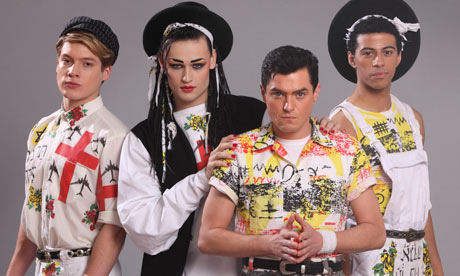preahvihearhotel.com – The 1980s was a decade of vibrant cultural shifts, with music and fashion playing pivotal roles in defining the era. Amidst this backdrop, the New Romantic movement emerged, characterized by its flamboyant style, androgynous fashion, and innovative music. At the forefront of this cultural revolution was Boy George, the charismatic lead singer of the band Culture Club. With his distinctive voice, eclectic fashion sense, and unapologetic attitude, Boy George became an icon, embodying the spirit of the New Romantic era.
The Rise of New Romanticism
New Romanticism was a movement that began in London, primarily in the nightclubs of the city. It was a reaction against the austerity of the late 70s and the punk movement, which had dominated the music scene. New Romantics embraced theatricality, drawing inspiration from various sources, including David Bowie’s glam rock, the decadence of the Roaring Twenties, and the elegance of the Edwardian era. The movement was not just about music; it was a lifestyle that celebrated individuality, creativity, and a sense of escapism.
Boy George: The Face of New Romanticism
Born George Alan O’Dowd in 1961, Boy George was a central figure in the New Romantic movement. His journey to stardom began in the late 70s, when he became a fixture in the London club scene, known for his striking appearance and charismatic personality. It wasn’t long before he formed Culture Club, a band that would go on to become one of the most iconic groups of the 80s.
With hits like “Do You Really Want to Hurt Me,” “Karma Chameleon,” and “Time (Clock of the Heart),” Culture Club quickly rose to fame, and Boy George became a global sensation. His androgynous look, which included colorful makeup, bold hairstyles, and eclectic clothing, challenged traditional gender norms and inspired a generation to express themselves freely.
The Impact of Boy George’s Music and Style
Boy George’s influence extended beyond music and fashion. He was an advocate for LGBTQ+ rights at a time when the community faced significant challenges. His open discussions about his sexuality and his refusal to conform to societal expectations made him a role model for many.
Moreover, Boy George’s music was a fusion of various genres, including pop, reggae, and soul, making it accessible to a wide audience. His ability to blend different musical styles, combined with his powerful voice and meaningful lyrics, left a lasting impact on the music industry.
Legacy
Although the New Romantic movement eventually faded, Boy George’s legacy endures. He continues to perform and create music, proving that his talent and influence are timeless. Boy George’s contribution to the 80s music scene and his role in the New Romantic movement have cemented his place in music history.
In conclusion, Boy George was more than just a singer; he was a cultural icon who led the New Romantic movement with his innovative music, distinctive style, and unyielding spirit. His impact on the music industry and society at large is a testament to his enduring legacy as one of the most influential figures of the 1980s.
